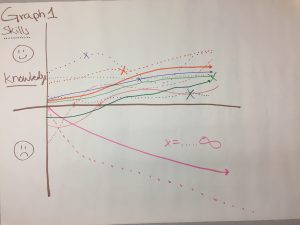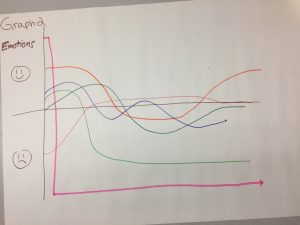As the semester becomes increasingly busy and overwhelming, it is important to take a step back and reflect on the accomplishments we’ve made, and to set goals that will guide as as we move forward. Listed below are our most pertinent weekly accomplishments as well as some goals for the upcoming weeks.
Achievements:
- Reached out to all assets to ask for permission and confirm information
- Established which community partners at UBC we will contact to set up trialling of the map
- Established what we collectively want to take away from the CBEL project in the moment of significant change workshop
Objectives:
- Contact UBC community partners to coordinate map trial
- Assign map trialling date
- Complete excel spreadsheet
- Delegate portions of the report to pairs of students
A Moment of Significant Change

A graph of each group member’s skills and knowledge, with dotted lines representing skills, and solid lines representing knowledge.

A graph of each group member’s emotions throughout the course of the semester and progression of the CBEL project.
At the close of our 9th week into the semester, our group had the opportunity to check in on our progress with our community project, and to re-assess the scope of our work in comparison to our initial proposal. Following an in-class activity where we constructed graphs of the progress of our skills and knowledge over time (pictured above), we were able to visualize the gains and losses, so to speak, over the semester. Where some of us had experienced a gain in skills, such as increased confidence in communicating with assets in the community, others experienced a loss and were discouraged by a high non-response rate. This trend of ups and downs was evident for each group member, and we discussed how we had each experienced these at different times over the last 2 months. These results can be related to the model of uncertainty and resolution introduced in class. Feelings of uncertainty surrounded us when we were first assigned the Vancouver Food Asset Map (VFAM) project, however this was quickly cleared up by an informative introduction by our community partners, the Vancouver Coastal Health public health dietitians. After this first stage of uncertainty and resolution, we experienced a second round after we began contacting our assigned assets to update their information and obtain permission. As quoted by Schulman (2005), “In the presence of uncertainty, one is obligated to learn from experience”, the commonality amongst group members in this session was a feeling of skills gained. In this current stage of resolution, we have had to come to terms with our moment of significant change in regards to how we understand the scope of our project.
Although we are fortunate that the scope of our project in regards to data collection and purpose has not changed, we feel that we have had to adjust the expectations of our own contribution. Initially elated that we could directly contribute to the VFAM, the group felt that we would be able to complete the information of 80 food assets across the city without too much difficulty. However, the complexity of this task unfolded as we encountered issues in finding the correct contact information for assets, a low response rate, and even withdrawal of consent. Much like Dan Barber in the “Latin Liver” podcast, who had to acknowledge the fact that there are always hidden complexities in nature, such was the case for our own project. In Dan Barber’s case, he attempted to recreate the harmonious habitat that Eduardo Sousa had accomplished for his humane foie gras geese (This American Life, 2011). For us, we experienced unforeseen challenges in updating the contact information of our food assets for our community partners — despite the fact that much of the information was already provided. As a result, the scope of our own contribution had to be modified. It was less of a moment of significant change as it was a moment of feeling insignificant. Now that we had invested our own time completing just a small portion of these assets, we began to appreciate the amount of time and energy that was required to create this extensive list. In the scope of a systemic, global issue such as food security, our contribution is infinitesimally small. Moving forward towards the completion of our project, we are gaining an appreciation of the volume of assets that are available in Vancouver. Although we may not be able to make a large impact in this project, and indeed in city food security for that matter, we can appreciate the amount of support that is currently available to Vancouverites. Our scope change has helped us to focus on the local impact of this tool, and the importance of increasing accessibility to food in each community across the city.
The Graceful Dismount
Now that the community-engagement part of the project has been completed, we are invested in finalizing the details of our report, and preparing to present our work to the world. We hope that our contributions to the VFAM project will have a meaningful influence on community members at all levels. It is also our hope that our work will reflect the changes in perception, knowledge, and appreciation we’ve seen in ourselves over the course of its completion.
Finishing well includes making sure loose ends (such as extraneous communication and paperwork) have been tied up, all goals set before and during the project have been met or addressed in some way, all participating parties are satisfied with the progress which has been completed, and the impact of the project has been evident through evaluation. As we approach the end of our project, it will be important to keep communication lines open, as talking with other participants and sharing the individual experiences/thoughts/feelings during the progress are an integral part of finishing well. We will draw on the support and expertise of our community partners to address any issues that may arise during this semi-final stage of our work.
References:
Shulman, L. S. (2005). Pedagogies of uncertainty. Liberal Education, 91(2), 18–25. Retrieved from http://files.eric.ed.gov/fulltext/EJ697350.pdf
This American Life (December 2, 2011). Ira Glass on Poultry slam 2011: Act 3: Latin liver with Dan Barber. Retrieved from https://www.thisamericanlife.org/radio-archives/episode/452/poultry-slam-2011?act=3#play
